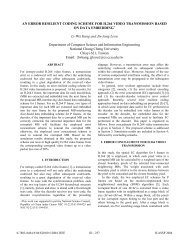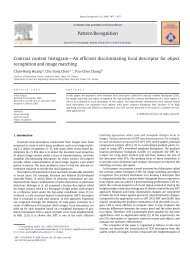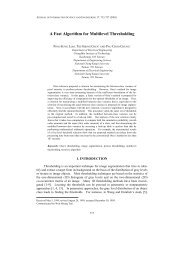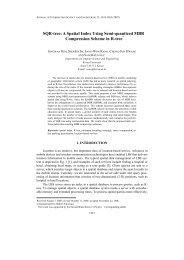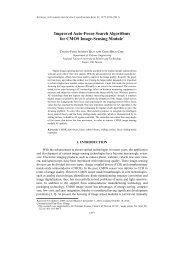Design, Implementation, and Performance Evaluation of Flash ...
Design, Implementation, and Performance Evaluation of Flash ...
Design, Implementation, and Performance Evaluation of Flash ...
You also want an ePaper? Increase the reach of your titles
YUMPU automatically turns print PDFs into web optimized ePapers that Google loves.
FLASH MEMORY-BASED FILE SYSTEM ON CHIP<br />
Table 2. Elapsed time for file operations (unit: ms).<br />
Operation FSOC Conv<br />
File read 1730 1603<br />
File creation 8986 28926<br />
Andrew 4920 4961<br />
The results are presented in Table 2. The file read experiment shows that the performance<br />
<strong>of</strong> FSOC is slightly lower (by about 8%) than the conventional storage device.<br />
This is due to the lower computing power <strong>of</strong> the storage device compared with that <strong>of</strong> the<br />
host system. On the other h<strong>and</strong>, the file creation experiment shows that the performance<br />
<strong>of</strong> FSOC is higher than the conventional storage device by about 69%. In the Andrew<br />
benchmark experiment, the conventional storage device <strong>and</strong> the FSOC show almost identical<br />
performance. This shows that the effect <strong>of</strong> reducing data traffic compensates for the<br />
performance degradation due to the lower computing power <strong>of</strong> the storage device.<br />
5.5 Summary <strong>of</strong> Experimental Results<br />
We can summarize the experimental results observed from this section as follows:<br />
• The performance model presented in section 4 matches well with measurement results<br />
obtained from the prototype implementation.<br />
• FSOC is beneficial when the computation time <strong>of</strong> the application is larger than the I/O<br />
time, <strong>and</strong> I/O time can be hidden by parallel execution. The gain, in this case, is equivalent<br />
to the file system code execution time <strong>of</strong> the host.<br />
• The lower the computing power <strong>of</strong> the host, the larger the gain for FSOC. This is because<br />
computing power <strong>of</strong> the host determines the file system code execution time at<br />
the host.<br />
• When multiple applications are executed, more benefit may be attainable for FSOC as<br />
I/O time can be hidden by the computation time <strong>of</strong> other concurrently executing applications.<br />
• The FSOC also reduces data traffic between the host <strong>and</strong> the storage, especially, for<br />
metadata intensive operations.<br />
6. CONCLUSION<br />
In this paper, we proposed <strong>and</strong> implemented an FSOC that contains a file system in<br />
the storage device with <strong>Flash</strong> memory as its storage media. FSOC provides a higher degree<br />
<strong>of</strong> interoperability than conventional storage devices <strong>and</strong> improves the efficiency <strong>of</strong><br />
the storage device by allowing the file system to be optimized specifically for the storage<br />
media <strong>of</strong> interest. Moreover, FSOC reduces the burden <strong>of</strong> developing or porting different<br />
file systems in the host system.<br />
Aside from these qualitative advantages, FSOC also provides quantitative advantages.<br />
<strong>Performance</strong> gains can be obtained through parallel execution <strong>of</strong> application code<br />
in the host <strong>and</strong> the file system code in the storage device. The FSOC also reduces data<br />
1883




